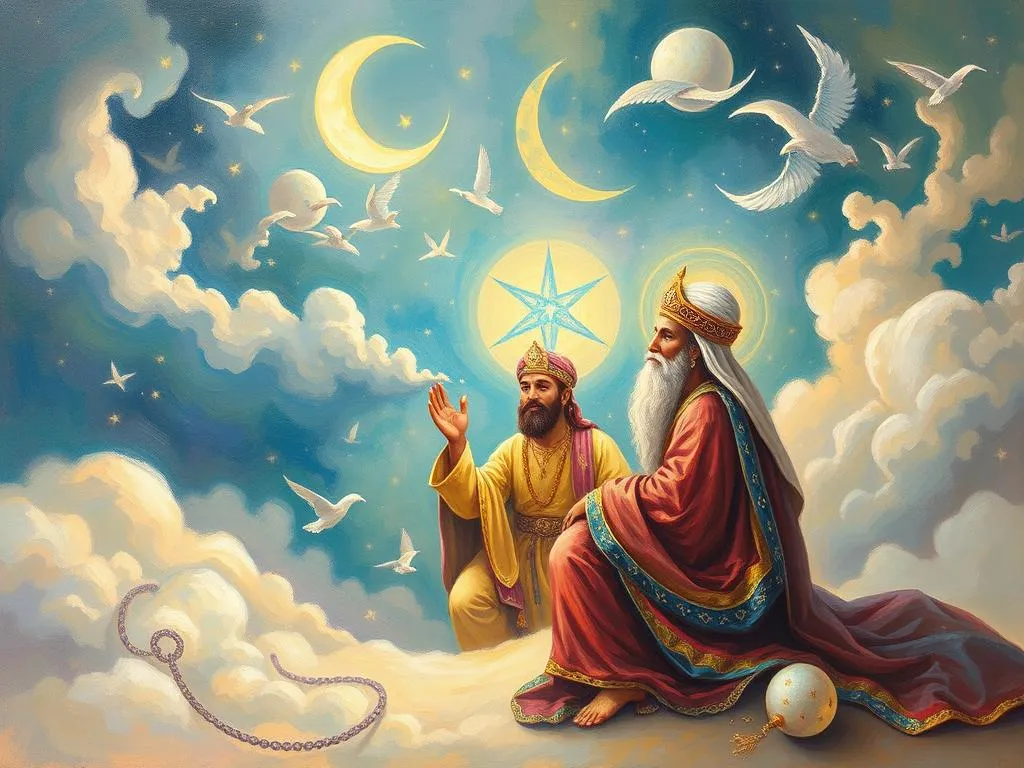
Dreams have intrigued humanity for centuries, serving as a mysterious window into our subconscious. They can be a tapestry woven from our daily experiences, hopes, fears, and sometimes, profound spiritual insights. For those within the Islamic tradition, dreams often hold significant cultural and spiritual importance. They are seen not merely as random images but as messages from the divine or reflections of our inner psyche. This article invites you to explore the rich tapestry of meanings behind dreams through a lens that intertwines Islamic beliefs, psychological insights, and cultural perspectives.
Have you ever woken up from a dream that left you feeling inexplicably unsettled or strangely uplifted? Perhaps you’ve encountered symbols that seemed to resonate deeply with something within yourself. Whether you consider dreams as divine messages, psychological reflections, or a blend of both, understanding their meanings can be a powerful tool for personal growth and insight. Let’s embark on this journey together, unveiling the hidden meanings behind your dreams through a framework that honors both your cultural heritage and the wisdom of the human experience.
Symbolic Pathways: Decoding the Language of Dreams
In Islamic tradition, dreams are often categorized into three types: true dreams, dreams from the self, and dreams from Shaytan (the devil). Understanding these classifications can help you interpret your dreams more accurately. True dreams, or ru’ya, are believed to come from Allah and often carry significant messages or prophecies. Dreams from the self reflect our thoughts, emotions, and experiences, while those from Shaytan may lead us to confusion or fear.
Symbols in dreams can vary widely but often draw from our cultural and spiritual backgrounds. For example, seeing a mosque in your dream might symbolize a search for spiritual connection or a call to prayer and reflection. Water, a powerful symbol in Islamic tradition, often represents purity, life, and spiritual nourishment. Conversely, if you dream of darkness, it might signify confusion, uncertainty, or an aspect of your life that needs illumination.
Furthermore, common symbols such as snakes may invoke feelings of fear or betrayal, as they are often associated with deceit, while birds can symbolize freedom and the soul’s journey towards enlightenment. By recognizing these symbols, you can begin to decode the messages your subconscious is trying to convey.
Dreamscapes of Reality: Navigating Personal Scenarios
Each dream is unique, shaped by our individual experiences and emotions. Let’s explore some common scenarios that many people encounter within their dreams and their potential meanings through an Islamic lens.
1. The Recurring Prayer: A Call to Reflection
Imagine you find yourself praying in a dream, perhaps in a beautiful mosque or a serene landscape. This dream might symbolize a deep longing for spiritual fulfillment or a desire to reconnect with your faith. It could be a gentle reminder from your subconscious to prioritize your spiritual well-being in your waking life.
2. The Lost Path: Searching for Guidance
In another scenario, you might dream of wandering in a vast desert with no clear direction. This can be representative of feelings of confusion or uncertainty in your life. The desert symbolizes a place of testing and reflection, urging you to seek clarity and guidance from Allah or your inner self.
3. Family Gatherings: Bonds of Connection
Dreaming of a family gathering, perhaps during a festive occasion like Eid, can evoke feelings of warmth, love, and community. In this context, it might signify a desire for connection with your loved ones or a need to strengthen familial ties. It could also indicate that family support is essential for your emotional well-being.
4. The Dark Stranger: Facing Fear
Encountering a dark figure or stranger in your dreams can be unsettling. This dream may represent your inner fears or unresolved conflicts. In Islamic thought, it could symbolize the presence of Shaytan, urging you to strengthen your faith and seek protection through prayer.
5. The Abundant Harvest: Reaping Rewards
Finally, dreaming of an abundant harvest, with lush crops and ripe fruits, is often a positive sign. It symbolizes prosperity, growth, and blessings to come. In the Islamic context, it may reflect the rewards of your hard work and dedication, both spiritually and materially.
Transformative Journeys: Embracing Personal Growth
Dreams offer a unique opportunity for personal growth and transformation. By understanding the messages contained within them, you can embark on a journey of self-discovery and healing. Here are some practical insights to help you harness the power of your dreams for your personal development.
1. Keep a Dream Journal
Start by maintaining a dream journal. Each morning, take a few moments to jot down details of your dreams, including symbols, emotions, and any significant events. This practice helps you develop a deeper awareness of your dream patterns and recurring themes, allowing you to connect the dots between your subconscious mind and waking life.
2. Reflect on Your Emotions
As you analyze your dreams, pay attention to the emotions you experienced during the dream and upon waking. Emotions can serve as valuable indicators, guiding you toward the underlying messages. For instance, if you felt anxious during a dream about losing your way, consider what aspects of your life might be causing similar feelings of uncertainty.
3. Seek Spiritual Guidance
If you find yourself struggling to interpret a particular dream, consider seeking guidance from a trusted religious leader or spiritual advisor. They can offer insights grounded in Islamic teachings that may illuminate your understanding of the dream’s significance.
4. Practice Mindfulness and Prayer
Integrate mindfulness practices and prayer into your daily routine. This can help you cultivate a deeper connection with your spirituality and enhance your understanding of the messages in your dreams. Engaging in regular prayer can also provide clarity and peace of mind, making it easier to interpret the symbols and themes in your dreams.
5. Embrace the Journey
Lastly, remember that the journey of understanding your dreams is a personal one. Be open to the insights that arise, and recognize that they may not always provide immediate answers. Embracing the process of self-discovery and personal growth will lead you to a richer understanding of yourself and your connection to the divine.
As you navigate the vast landscape of your dreams, remember that they are not merely fleeting images but profound reflections of your inner world. Each dream is a unique puzzle piece that, when assembled, can provide a clearer picture of your spiritual journey and personal growth. By honoring the symbolism, exploring your experiences, and embracing the opportunity for transformation, you will find a deeper connection to yourself and your faith.
In the end, your dreams are a sacred dialogue between your soul and the universe, guiding you towards understanding, healing, and ultimately, enlightenment. So, the next time you awaken from a dream, take a moment to pause and reflect, for it may hold the keys to unlocking your true potential.







